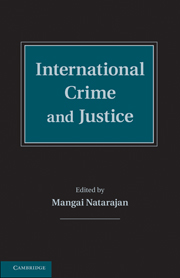Book contents
- Frontmatter
- Contents
- List of Figures
- List of Tables
- List of Contributors
- Foreword
- Preface
- Introduction
- Part I International Criminology
- Part II Law, Punishment, and Crime Control Philosophies of the World
- Part III Transnational Crime
- Part IV Organized Crime and Terrorism
- Part V International crime
- Part VI Delivering International Justice
- 44 The Role of the United Nations
- 45 Treaties and International Law
- 46 International Criminal Tribunals and Hybrid Courts
- 47 The International Criminal Court
- 48 The ICC and the Darfur Investigation
- 49 Victims’ Rights in the International Criminal Court (ICC)
- 50 Nongovernmental Organizations and International Criminal Justice
- 51 Global and Regional Human Rights Commissions
- 52 The Truth and Reconciliation Commission in South Africa
- 53 The Guatemalan Truth Commission
- Part VII International Cooperation and Criminal Justice
- Part VIII International Research and Crime Statistics
- Part IX International research resources
- World Map
- Index
- References
48 - The ICC and the Darfur Investigation
Progress and Challenges1
Published online by Cambridge University Press: 05 October 2014
- Frontmatter
- Contents
- List of Figures
- List of Tables
- List of Contributors
- Foreword
- Preface
- Introduction
- Part I International Criminology
- Part II Law, Punishment, and Crime Control Philosophies of the World
- Part III Transnational Crime
- Part IV Organized Crime and Terrorism
- Part V International crime
- Part VI Delivering International Justice
- 44 The Role of the United Nations
- 45 Treaties and International Law
- 46 International Criminal Tribunals and Hybrid Courts
- 47 The International Criminal Court
- 48 The ICC and the Darfur Investigation
- 49 Victims’ Rights in the International Criminal Court (ICC)
- 50 Nongovernmental Organizations and International Criminal Justice
- 51 Global and Regional Human Rights Commissions
- 52 The Truth and Reconciliation Commission in South Africa
- 53 The Guatemalan Truth Commission
- Part VII International Cooperation and Criminal Justice
- Part VIII International Research and Crime Statistics
- Part IX International research resources
- World Map
- Index
- References
Summary
INTRODUCTION
The investigation in the Darfur region of Sudan, where one of the worst humanitarian crises in the world is still unfolding, has been especially challenging for the newly founded International Criminal Court. The Prosecutor of the ICC has succeeded in completing the investigation of three cases against senior leaders in Darfur, in spite of the huge and complex nature of the crimes, lack of cooperation, security threats, and open armed conflict. This chapter will provide a brief introduction on the Darfur investigation with a timeline of legal precedents, and focus on the cases brought before the ICC judges, the methods and evidence utilized for this investigation, and the issues that still need be resolved to ensure prospects of justice for the victims of Darfur.
BACKGROUND
In February 2003, fighting erupted between Sudanese military troops and Darfur rebels, who were accusing the government of purposefully marginalizing the western region of Darfur from the economic and political agenda, and of discriminating against the local tribes of the Fur, Zaghawa, and Masalit. The government responded with a brutal counterinsurgency campaign (assisted by the Janjaweeds, militias from Arab tribes) that quickly escalated to widespread and indiscriminate violence. A large part of the civilian population fled to eastern Chad, and hundreds of thousands of civilians were internally displaced within Sudan (Prunier, 2005).
- Type
- Chapter
- Information
- International Crime and Justice , pp. 366 - 372Publisher: Cambridge University PressPrint publication year: 2010
References
- 1
- Cited by



